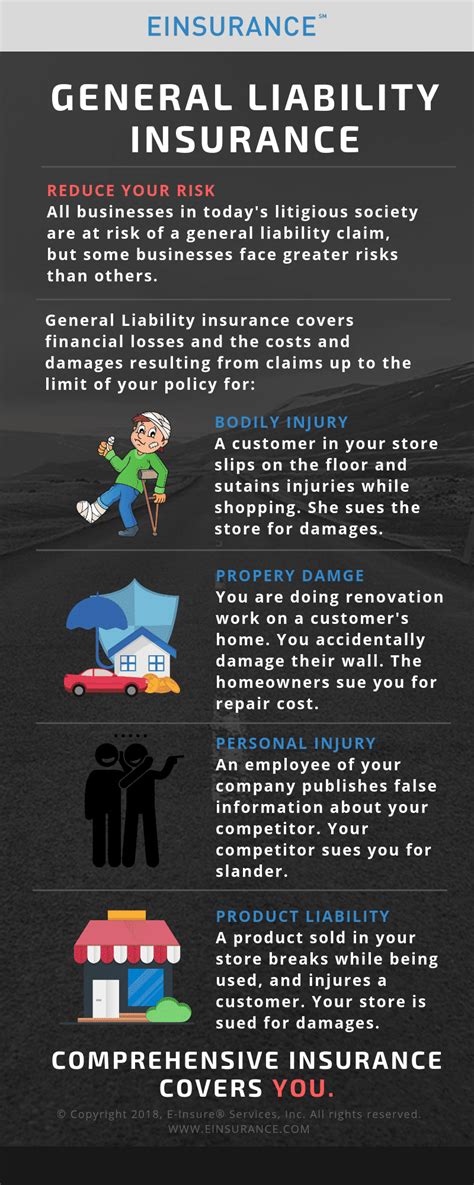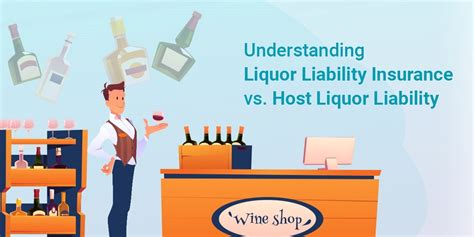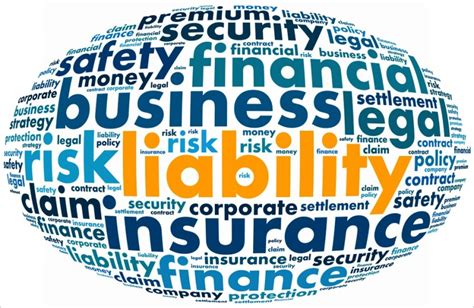Commercial Insurance Liability

Commercial insurance liability is a critical aspect of risk management for businesses across various industries. It serves as a protective shield, safeguarding companies from potential financial losses arising from lawsuits, property damage, and other liability claims. This comprehensive guide delves into the intricacies of commercial insurance liability, offering an in-depth analysis of its importance, coverage options, and the steps businesses can take to ensure they are adequately protected.
Understanding Commercial Insurance Liability

Commercial insurance liability, often referred to as business liability insurance, is a form of coverage that protects businesses from a wide range of potential risks. These risks can include bodily injury, property damage, personal and advertising injury, and other types of third-party claims. The primary purpose of this insurance is to provide a financial safety net, ensuring that businesses can manage the costs associated with legal defense and any damages awarded in a lawsuit.
The need for commercial liability insurance arises from the inherent risks involved in running a business. Whether it's a slip and fall incident on your premises, product defects leading to customer harm, or even libel and slander claims, businesses face a multitude of potential liabilities. By securing appropriate insurance coverage, businesses can mitigate these risks and ensure their financial stability in the face of unexpected legal challenges.
Key Components of Commercial Insurance Liability

Commercial insurance liability is not a one-size-fits-all solution. It encompasses several key components, each tailored to address specific types of risks. Understanding these components is essential for businesses to make informed decisions about their insurance coverage.
General Liability Insurance
General liability insurance is the foundation of most commercial insurance policies. It provides broad protection against common risks such as bodily injury, property damage, and personal and advertising injury claims. This coverage can be invaluable in protecting businesses from the financial fallout of accidents or lawsuits, ensuring they can continue operating smoothly.
| Coverage Type | Description |
|---|---|
| Bodily Injury | Covers medical expenses and legal costs arising from injuries sustained by customers or visitors on the business premises. |
| Property Damage | Pays for repairs or replacement of damaged property owned by others, such as a client's equipment damaged during a service call. |
| Personal and Advertising Injury | Provides protection against claims of libel, slander, copyright infringement, and other forms of reputational harm. |

Product Liability Insurance
Product liability insurance is specifically designed for businesses that manufacture, distribute, or sell physical products. It safeguards against claims arising from product defects, incorrect labeling, or other issues that could cause harm to consumers. With the potential for significant financial liability in product-related lawsuits, this coverage is essential for many businesses.
Professional Liability Insurance (Errors & Omissions)
Professional liability insurance, also known as errors and omissions (E&O) insurance, is tailored for businesses providing professional services. It protects against claims of negligence, errors, or omissions in the delivery of these services. From accounting firms to consulting agencies, this coverage is crucial for businesses where the quality of service can have significant financial implications.
Commercial Auto Insurance
Commercial auto insurance is vital for businesses that operate vehicles as part of their operations. It provides liability coverage for accidents involving company-owned vehicles, protecting the business from financial losses resulting from bodily injury or property damage claims.
Assessing Your Business’s Liability Risks
Every business operates within a unique set of circumstances, and understanding these circumstances is crucial for effective risk management. Here’s a step-by-step guide to help businesses assess their liability risks and determine the appropriate insurance coverage.
Identify Potential Hazards
Start by conducting a thorough assessment of your business operations. Identify potential hazards that could lead to accidents or lawsuits. This could include anything from slip and fall hazards on your premises to the risks associated with your products or services. For instance, a restaurant would need to consider kitchen safety and food contamination risks, while a tech startup might focus on data privacy and security.
Evaluate Your Business’s Exposure
Consider the financial impact that a lawsuit or liability claim could have on your business. Assess your assets, including property, equipment, and cash flow. Determine the potential costs of legal defense and damages, and evaluate whether your business could withstand such financial strain. This evaluation will help guide your decision-making process when choosing insurance coverage limits.
Review Past Incidents and Claims
Examine your business’s history of accidents, injuries, and claims. Analyze any patterns or trends that could indicate recurring risks. For example, if your business has faced multiple slip and fall incidents in the past, it’s a clear indication that you need to prioritize liability insurance coverage for such incidents.
Consider Industry-Specific Risks
Different industries come with their own unique set of risks. Construction companies, for instance, face risks associated with heavy machinery and worker safety, while tech startups might grapple with intellectual property disputes. Understanding these industry-specific risks is crucial for tailoring your insurance coverage to your business’s needs.
Choosing the Right Commercial Insurance Liability Coverage
With a clear understanding of your business’s liability risks, you can now make informed decisions about your insurance coverage. Here are some key considerations to guide you in choosing the right commercial insurance liability policy.
Select Comprehensive Coverage
Opt for a policy that offers comprehensive coverage, ensuring protection against a wide range of potential liabilities. While it might be tempting to choose a policy with lower premiums, remember that a comprehensive policy provides more robust protection, potentially saving your business from significant financial losses.
Assess Coverage Limits
Evaluate the coverage limits of your policy. These limits dictate the maximum amount your insurer will pay out for a covered claim. Choose limits that align with your business’s financial exposure, ensuring you have adequate protection in the event of a major lawsuit or loss. Remember, underinsuring can leave your business vulnerable to significant financial risks.
Review Policy Exclusions
Carefully examine the exclusions listed in your policy. These are situations or risks that are not covered by your insurance. Understanding these exclusions is crucial to ensure you’re not caught off guard in the event of a claim. For example, some policies might exclude coverage for certain types of accidents or claims arising from specific business activities.
Consider Additional Coverage Options
Depending on your business’s unique needs, you might want to consider additional coverage options. For instance, if you operate in an industry with high intellectual property risks, you might benefit from cyber liability insurance. Similarly, if your business involves extensive travel, you might need to consider travel insurance for your employees.
The Role of Risk Management Strategies

While commercial insurance liability is a vital component of risk management, it’s not the only strategy businesses should employ. Implementing effective risk management practices can further reduce the likelihood of liability claims and help your business operate more safely and efficiently.
Implement Safety Protocols
Develop and enforce safety protocols within your workplace. This could include training programs for employees on safety procedures, regular equipment maintenance, and clear signage to prevent accidents. By proactively addressing safety concerns, you can reduce the risk of accidents and liability claims.
Regularly Review and Update Your Insurance
Insurance needs can change over time as your business grows and evolves. Regularly review your insurance policies to ensure they still align with your business’s current operations and risks. Update your coverage as necessary to ensure you maintain adequate protection.
Stay Informed on Industry Trends
Keep abreast of industry trends and changes that could impact your business’s liability risks. For example, emerging technologies might introduce new risks or alter existing ones. By staying informed, you can anticipate potential challenges and take proactive measures to manage them.
The Future of Commercial Insurance Liability
As the business landscape continues to evolve, so too will the nature of commercial insurance liability. Here’s a glimpse into some of the potential future developments and their implications for businesses.
Increasing Focus on Cyber Risks
With the growing prevalence of cyber attacks and data breaches, cyber liability insurance is expected to become an increasingly critical component of commercial insurance policies. As businesses rely more on digital technologies, the risks associated with cyber threats will continue to rise, making this type of insurance essential for many organizations.
Adoption of New Technologies for Risk Assessment
The insurance industry is likely to leverage advanced technologies like artificial intelligence and machine learning for more accurate risk assessment. These technologies can analyze vast amounts of data to identify patterns and predict potential risks, helping insurers offer more tailored coverage options to businesses.
Enhanced Emphasis on Prevention
In the future, there may be a greater focus on preventative measures to reduce the likelihood of liability claims. This could involve insurers working more closely with businesses to implement robust risk management strategies, potentially offering incentives or discounts for businesses that take proactive steps to mitigate risks.
Conclusion
Commercial insurance liability is a critical aspect of business risk management, providing a vital safety net against financial losses arising from liability claims. By understanding the various components of commercial insurance liability, assessing their business’s unique risks, and choosing the right coverage, businesses can protect themselves from potential financial ruin. Furthermore, by implementing effective risk management strategies and staying attuned to future developments, businesses can ensure they remain resilient and well-prepared in the face of evolving risks.
What are the potential consequences of inadequate commercial insurance liability coverage?
+Inadequate commercial insurance liability coverage can leave a business vulnerable to significant financial losses. If a business faces a lawsuit or liability claim and does not have sufficient coverage, it may be forced to pay out-of-pocket for legal expenses, damages, and settlements. This can strain a business’s finances, potentially leading to financial instability or even bankruptcy.
How often should businesses review their commercial insurance liability policies?
+Businesses should review their commercial insurance liability policies annually or whenever there are significant changes to their operations or risk profile. This ensures that their coverage remains aligned with their current needs and that they have adequate protection against emerging risks.
What are some common exclusions in commercial insurance liability policies?
+Common exclusions in commercial insurance liability policies may include intentional acts, contract disputes, pollution, and war-related risks. It’s important for businesses to carefully review their policies to understand what is and isn’t covered, as exclusions can vary significantly between insurers and policy types.



